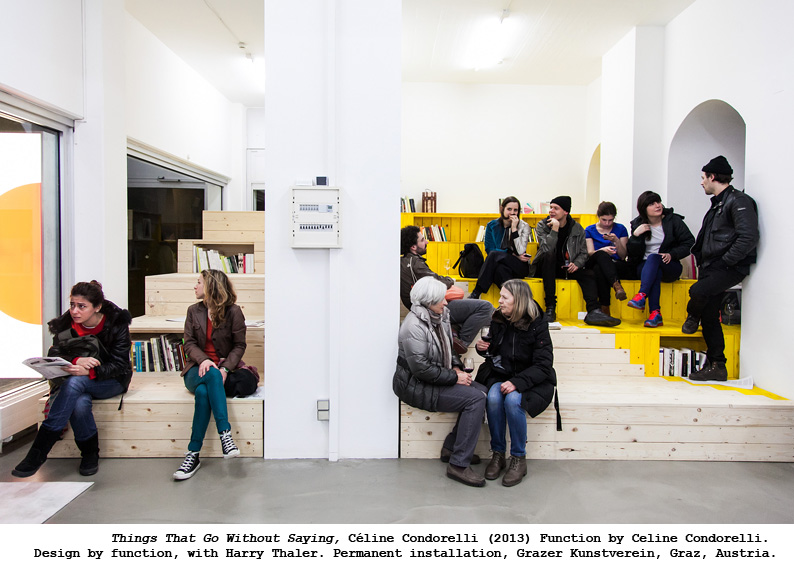
Time: Thursday 4 September 2014, 6 – 8 PM
Venue: Konstfack, Mandelgrensalen (next to Svarta havet)
LM Ericssons väg 14, Stockholm. T-bana: Telefonplan
The eighth Organising Discourse lecture session explores approaches to research and education as forms of discursive space.
London based artist Céline Condorelli will talk about her investigations into forms of display by problematizing the notion of ‘support’. Hélène Frichot, Australian architecture researcher and teacher, will talk about experimental methodologies in architecture practice and the invention and construction of a feminist design power tool.
CÉLINE CONDORELLI
SUPPORT STRUCTURES
My practice is concerned with how our encounter with the material world happens through counting on it, and the fact that all human action takes place amidst countless structures of support mostly taken for granted, and therefore appearing almost invisible.
I have been focusing on the problematics of forms of display and the manifestations of blindness towards them, by re-imagining them through a variety of possible relations between context, exhibition, work, and the public; which has in turn allowed the questioning of these categories and the notions they form. This particular attention has developed through installations, exhibitions and publications that foreground display by proposing it as my main artistic medium in both form and subject, through the construction of structures of display, staging devices and framing mechanisms, the apparatuses of visibility that I have come to designate as ‘support structures’.
I have been investigating forms of display by
problematizing the notion of ‘support’ –the physical, economical, social, political structures and
infrastructures that correspond to conditions of possibility. This investigation is undertaken as an entanglement between two modes of articulation: historical and theoretical on the one hand, and one grounded in my art practice on the other. In both, the notion of ‘support’ is used as a critical lens through which to interrogate the development of forms of display, by examining that which sustains them.
HÉLÈNE FRICHOT
HOW DO YOU MAKE YOURSELF A FEMINIST DESIGN POWER TOOL (IT’S LESS A MATTER OF MEANING THAN A QUESTION OF USE)?
The invention and construction of a feminist design power tool is an inevitable act of experimentation that necessarily deals with the situation at hand, with the problems that face you right here, right now. It is anything you want it to be, so long as it works, but then the onus is on you to delineate the ethico-aesthetic criteria of assessment that determine how well it has worked in situ. Tool and method are closely associated, and if there is anything that the creative disciplines needs it is a way to celebrate the ways of doing they already actively deploy; ways of doing or methodologies that are distinct from the sciences. To apply a tool you need some working method, and once you reflect on this method, what you have is a burgeoning methodology, that is, a logic of how you are doing what you are doing. This means that your tool can subsequently be passed from hand to hand, transforming the subject who handles the tool, the tool itself, and the situation that the tool is being applied to. A ‘power-tool’ alludes to hand-held motorised power tools, but also to the equally real question of power relations and how they are redistributed across existential territories. Power relations can enable liberatory encounters and new modes of life, but they can also devolve into bad habits and oppressive regimes. This lecture will address the role of the feminist design power tool as it has developed in Critical Studies in Architecture, a teaching and research group at KTH Architecture, Stockholm. The discussion will be set amidst the conceptual context of what has come to be called material feminisms, and will draw on such thinkers as Isabelle Stengers, Karen Barad, Rosi Braidotti and Donna Haraway.
CÉLINE CONDORELLI
Céline Condorelli is a London-based artist who makes supporting structures; she is the author and editor of Support Structures published by Sternberg Press (2009), and one of the founding directors of Eastside Projects, an exhibition space in Birmingham, UK; she is currently Professor at NABA (Nuova Accademia di Belle Arti) Milan. Recent exhibitions include Céline Condorelli, Chisenhale Gallery, and Positions, Van Abbemuseum including the publication The Company She Keeps, Bookworks, and baubau, Museum of Contemporary Art, Leipzig, Germany (all 2014), Puppet Show, Puppet Show, Gävle Konstcentrum, Grundy Art Gallery (2014), Additionals, Project Art Centre, Dublin, Ireland, Things That Go Without Saying, Grazer Kunstverein, Austria, The Parliament, ‘Archive of Disobedience’, Castello di Rivoli, Italy (2013), Social Fabric, Iniva, London and Lund Konsthall, Sweden (2012), Surrounded by the Uninhabitable, SALT Istanbul (2012) “There is nothing left”, Alexandria Contemporary Arts Forum, Egypt and Oslo Kunstforening (2011-12), Manifesta 8, Murcia (2010), Revision‘part 1 and 2’, Artists Space, New York, (2009), and Cell Projects, London, 2010).
HÉLÈNE FRICHOT
Dr Hélène Frichot is a researcher and teacher in Critical Studies in Architecture, School of Architecture and the Built Environment, KTH, Stockholm. She has co-curated the Architecture+Philosophy public lecture series with Esther Anatolitis in Melbourne, Australia since 2005 (http://
For teaching blogs see:
www.archandphil.wordpress.